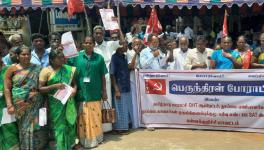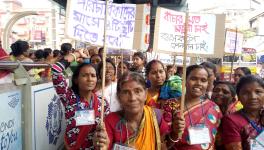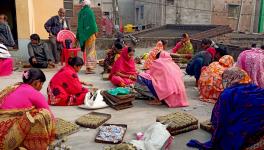TN: Domestic Workers Protest, Demand Minimum Wage, COVID-Relief
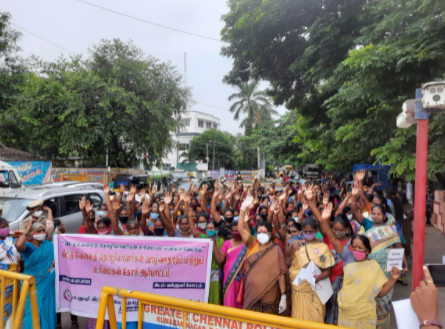
Courtesy: tnlabour.in
Chennai: Domestic workers held a protest here on October 16, accusing the government of continuous negligence during the pandemic. Several domestic workers who lost their jobs during the first wave of COVID-19 pandemic are yet to find work due to the perceived stigma from employers.
There are about 18 lakh domestic workers in Tamil Nadu. However, the registration process for them in the welfare board has become cumbersome after introduction of online registration. The workers have opposed this and have also demanded that the state government revise the minimum wage from Rs 37 per hour to Rs 80 per hour, considering the prevailing inflation.
The Union government is yet to ratify the International Labour Organisation 2011 convention on domestic workers setting global labour standards in accordance with national laws.
LOSS OF LIVELIHOOD AND LACK OF GOVERNMENT RELIEF
Since the first wave of the pandemic and the total lockdown in March 2020, domestic workers have continued to suffer. With normalcy limping back, a majority of workers are yet to get their jobs back.
Around 80% of the domestic workers have reportedly lost their jobs. Domestic work comes under the unorganised sector, with high participation of women workers.
The National policy on domestic workers claims that as per National Sample Survey Organisation (NSSO) statistics, there are an estimated 39 lakh domestic workers, of which 29 lakh are women.
“The governments have not considered the plight of domestic workers in spite of repeated demands and protests”, says Pushpa, a domestic help and state treasurer of Tamil Nadu Domestic Workers Union.
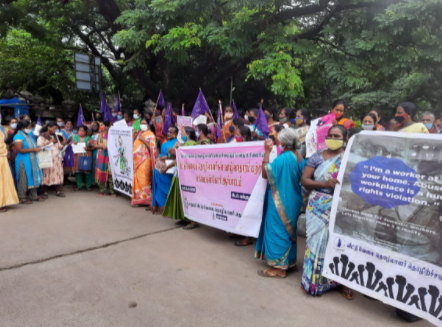
Domestic Workers protest in Chennai demanding revision of minimum wage and regularisation of enrolment in welfare board. (Courtesy: tnlabour.in)
“When we lost our livelihood due to the pandemic, the state and Union governments hardly helped us to overcome the crisis”, Pushpa said.
Employers are hesitant to re-employ domestic workers, fearing the spread of the infection. “My employer has asked us to stay away from work, citing the possibility of the virus spreading since we travel and visit a few households for work”, said Muthamma, another domestic worker.
The state government announced a one-time relief of Rs 2,000 to domestic workers registered with the Tamil Nadu Unorganised Workers Welfare Board in 2020, distributing grocery kits and one-time cash relief of Rs 4,000 for ration card holders in May 2021.
Considering the prolonged period of loss of employment and wages, the relief announced was trivial, say the women, adding that they had to spend more on feeding their children since the schools were closed and mid-day meals were stopped.
“My husband was unable to find a job due to the pandemic, and our income is totally choked. Paying rent for the house and feeding our children is tough for us”, Muthamma said.
The Tamil Nadu Domestic Workers Welfare Board is one of the 18 welfare boards for unorganised workers functioning under the labour welfare and skill development department. The registration process has been shifted to online mode, becoming a hurdle for the workers.
“Most of the workers are not familiar with such a process, and some don't even have the luxury of owning a mobile phone, preventing them from registering with the board”, Pushpa said.
The workers also demanded that the registration process be facilitated by the trade unions rather than the online process mandate.
REVISE WAGE, SIMPLIFY WELFARE BOARD REGISTRATION
The Tamil Nadu government had fixed minimum wages for workers in August 2018. As per the announcement, unskilled workers should be paid Rs 37 per hour, semi-skilled workers are entitled to Rs 38 per hour, and skilled workers should be paid Rs 39 per hour.
“The wage fixed was meagre, and considering the increase in the cost of living, per hour wage must be increased to Rs 80”, said Pushpa.
The union has also demanded that the state government increase the pension from Rs 1,000 to Rs 3,000 and reduce the eligible age for receiving a pension to 50 years from the existing 60 years.
“Our physical well -being reduces drastically after child birth and continuous work and hence the eligible age must be reduced”, said Pushpa.
Get the latest reports & analysis with people's perspective on Protests, movements & deep analytical videos, discussions of the current affairs in your Telegram app. Subscribe to NewsClick's Telegram channel & get Real-Time updates on stories, as they get published on our website.










